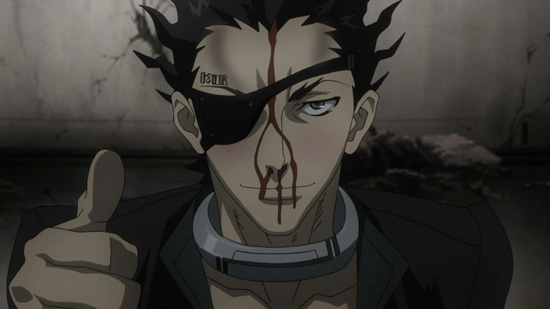
Germany in Hetalia: Axis Powers. Ragna the Bloodedge in BlazBlue. JP in Redline.
If you enjoyed the voice of a character with a slightly lower vocal range in the English dub of a recent anime or video game, you likely have Patrick Seitz to thank.
After an unsuspecting start in Geneon’s English-language adaptation of Amazing Nurse Nanako in 2000, Seitz has since become one of the most prolific voice actors working in the American anime and video game industries. With over 100 credits to his name, including Sloth in Fullmetal Alchemist: Brotherhood, Franky in One Piece, and Senji in the recent Adult Swim-featured Deadman Wonderland, it might be easier to ask what Seitz hasn’t been in as of late.
Outside of anime, Seitz has also lent his talents to several American properties, most notably providing voicework for Blizzard Entertainment’s immensely popular World of Warcraft, Diablo, and Starcraft franchises, and NetherRealm Studios’ long-running fighting game series Mortal Kombat.
He has also handled ADR direction and script adaptation for a number of anime shows, including Monster, Steins;Gate, and Summer Wars.
We sat down with Seitz at Nan Desu Kan 16 to pick his brain about the process of adapting scripts into English, being Scorpion in Mortal Kombat, and selling Monster to Hetalia fans.
OUSA: So what have you been up to lately? Read anything, watch anything that you really want to talk about?
Seitz: Recently, I watched Twin Peaks for the first time. It was on Netflix, and I figured “well, it’s been 20 years, I suppose I should get caught up.”
OUSA: What did you think of, ah, season 2?
Seitz: Yeah… I liked it up until they solved, basically, the reason for the show existing. And then suddenly there were new characters and people were randomly in love with them, and I was calling BS. So, very good 1½ seasons in an — unfortunately — 2 season show. But it was fun, I’m glad I watched it, and now I need to go back, catch all of the cultural allusions to it that have popped up over the years.
OUSA: Has anyone told you to go play Deadly Premonition yet?
Seitz: Funny you should mention that. I bought it, played some of it, said “this is balls!” But I’m going to go back now and give it another chance.
OUSA: Yeah, I think that might be one of those games where… it’s like you need a guided tour, almost. Someone who’s been there, done that, knows what to do and not do.
Seitz: I just like the way Francis York Morgan flaps his badge at people, like his arm has a mind of its own. Also, I think I need to install the game on my hard drive, because the load times are insane.
Anyway, I also need to go back and get caught up on Breaking Bad, I’ve seen like two episodes, love it, have been told that it’s the best thing since The Wire, maybe even better. At some point I’ll watch more The Walking Dead, Game of Thrones, that sort of thing. Basically, I don’t have cable, so I’ll catch them when I catch them, y’know? I’m also not really one for watching an episode of something, waiting a week, watching another episode. I’d rather wait until everything’s done so I can just plow through it. Again, again, again — another one! — again, again! That’s what we ended up doing with The Wire, just watched 5 or 6 of them in a sitting, because… how can you not?
OUSA: I am now recognizing the irony of conducting an Otaku USA interview with Patrick Seitz in which we talk entirely about recent American pop-cultural touchstones.
Seitz: (laughs)
OUSA: Okay. I know you’re extremely proud of the work you did as voice director and scriptwriter for the English-language version of Monster. So let’s expand some horizons, here. Since Hetalia’s popularity seems without end at this point… sell Monster to the Hetalia crowd.
Seitz: Well, guys… (laughs) …If you like Hetalia, and you like Germany — and I hope you do because I voice Germany — then you should really like Monster because it’s set largely in Germany! You’ve got the East German, West German thing, you’ve got mind-control experiments in the Czech Republic, you’ve got your Europe fix, your anime fix, but the main character Dr. Tenma’s still Japanese, so–
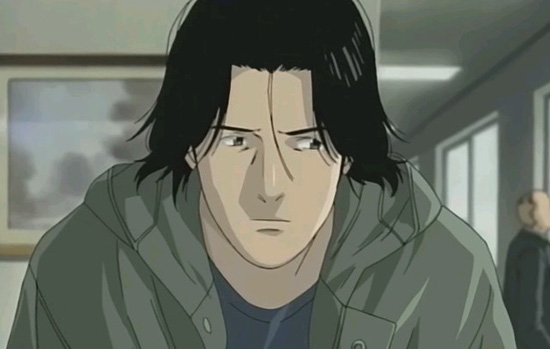
OUSA: How bishounen is Dr. Tenma?
Seitz: Not very, but…
OUSA: You’re losing me, here.
Seitz: He’s very bishounen. He’s a pretty boy. And sometimes when he’s on the run he doesn’t shave, his hair gets a little shaggy, and that’s pretty delightful, he looks downright sparkly. He’s… he’s like France, but with dark hair. And then there’s Johan, who’s evil, and very bishounen. He’s got pretty hair, very pretty hair, and a soft voice. You just want him to tell you things, secret things, just have him whisper in your ear. Watch Monster.
OUSA: I think we hit a lot of the checkboxes with that one.
Seitz: “Johan has pretty hair.” Words I never thought I would be saying! But it’s true. Just didn’t think I’d be using that as a sales point. You’ve broadened my horizons! (laughs)
OUSA: Well, we’ll see what happens when they sit down and watch it.
Seitz: It’s such a good show! And the whole thing, Japanese subbed, is still on Netflix, and the dub, to my knowledge, is still available on Hulu.
OUSA: Actually, I think it’s unavailable on Netflix right now, but…
Seitz: Well then they’ll just have to watch the dub on Hulu! Or the sub. I mean, I’m just glad the show’s out there. One of my biggest regrets — well, regret isn’t really the right word, since there was nothing I could do to change what happened — is that it’s not out there in its entirety on a physical format. People come up to me at conventions with the first box set, the first 13 episodes, and I feel such conflicting emotions. “Thank you for loving the show!” and “I’m sorry you got screwed.”
OUSA: It happens.
Seitz: I’m just thankful the show got dubbed in its entirety. It’s a slow burn, it’s not something people cosplay, it doesn’t have totebags at Hot Topic. It’s not that kind of show. Which I think is part of the reason it didn’t get released in its entirety, because when it came out — and bear in mind, this is just me talking out of my butt, here — when it didn’t do Naruto or Bleach numbers, well, they decided not to throw good money after bad, let’s say. I still really wish I’d wake up some morning, just rub my eyes, look through the morning haze and see all of Monster lying there in DVD form.
OUSA: Or just, maybe, a blimp in the sky saying “go to this internet address and watch whatever appears on your computer screen. It’s great. Trust me.”
Seitz: Or that. That works too.
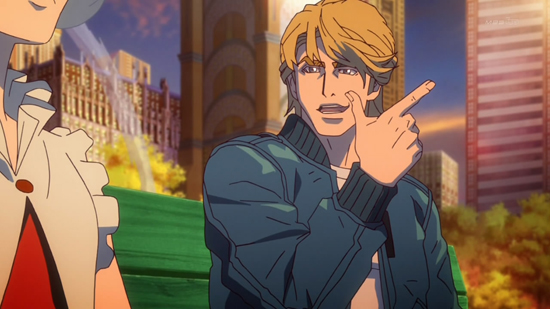
OUSA: I have a quote here from your appearance at Anime Expo regarding Tiger & Bunny. You’re playing the character Sky High in that show, and when someone asked you how you felt about the character you said “I think I’m like Sky High to a certain extent. He’s very earnest and idealistic, and sometimes he doesn’t pick up on certain details. Like me! Also he thanks people all the time.” Is that actually based on reality, or were you just joking around?
Seitz: I think it’s true. I’m not very detail oriented. I’m not good at multi-tasking, and sometimes the seemingly obvious things float right by me. But I’m pleasant! I’m definitely more like Sky High than Rock Bison, or Fire Emblem. (laughs)
OUSA: Yeah, actually, whenever Fire Emblem showed up I was just… burying my head in my hands a little bit. But the voice actor they got for that character, John Eric Bentley, seemed to be taking it all in stride. Are the writers for the English version of the show taking any liberties or changing the way any of the characters are written, to your knowledge?
Seitz: I’ve only heard little chunks of what everyone else is doing so far, especially with Sky High. Even when I would go in to record, he speaks so infrequently that I didn’t get a really good core sample of what everyone else was doing. From what I remember of watching the show in Japanese, what I’ve heard of the English version seems pretty faithful. Nothing jumps out at me as being drastically different from the original. I’d say we’re in the ballpark, from what I’ve heard.
OUSA: On a similar note, you worked on some of the script adaptation for the English version of Dragon Ball Kai, and that was after other people, J. Michael Tatum for example, had already been working on the show, and on Dragon Ball in general, for a long time. How many people were working on Kai, and when did you join the project?
Seitz: I’m not entirely sure about the first question, actually. I know when I came on Tatum had been doing some of the scripts, I was doing some, and there must have been some other people too just because of how many episodes there were. Also, I came into it late. I’m sure it wasn’t just Tatum carrying this herculean load before that.
Working on Kai was actually kind of tough! I didn’t have that much background with Dragon Ball, and it’s hard when a show is such an institution and everyone’s been doing it for so long. It’s tough to be the new kid. I think what I did worked, but it’s definitely a show where the fans have expectations.
OUSA: Yeah, I mean, I just did the basic search online, “Dragon Ball Kai Patrick Seitz Script” or something, and immediately I see just… angry forum posts, people demanding… I actually didn’t have enough context to figure out what their complaints were about, exactly, but they were upset and using your name.
Seitz: I think it was probably the usual thing when you’re adapting something from Japanese into English. “Why is it not exactly what it said in the Japanese?” But it’s even worse when, in this case, it was us going from English to English, because people had existing episodes to directly compare to, as opposed to a foreign language they don’t understand.
It’s tough, but it can’t be the same because there’s different lip flap. There’s different animation used, we can’t use the same lines. If they were able to just copy and paste the dialogue from the original show, that would have been much faster, much cheaper.
But we couldn’t do that. I mean, every time I do a script, I’m not blowing it off, I’m not half-assing it. I write them all in good faith, and if the people in charge, the people writing the checks don’t like what I’m doing, they’ll let me know. I got notes, actually! “Change this, this character’s a little more this way, this character’s a little more that way,” so there was definitely a back and forth. I wasn’t just writing whatever I wanted in there, yelling “YOLO!” and tossing it out into the universe.
OUSA: Did you have anything like setting guides, a big, detailed binder full of meticulously culled information to help you keep track of everything?
Seitz: There was much material given to me. I read the whole megillah. I watched it, I did as much research as I could. I mean, I didn’t just jump in and start asking, “Hey, who’s this guy? Why is everyone yelling so much?! Why’d his hair turn blonde?!” There was due diligence done.
OUSA: Out of curiosity, who brought you on board originally?
Seitz: John Burgmeier, who’s the head scriptwriter over there. He did work on the original show, and… he knows his stuff, basically. He was the one giving me all of the feedback, and he’s got an amazing mind for detail.
OUSA: Have there been any other projects where you felt the same way going in, like you were entering some kind of holy institution, some kind of mecca?
Seitz: Not to that degree. I mean, there’s always going to be that internet hate brigade. “Why have you taken this perfect Japanese thing and sullied it with our barbarian tongue?” But that’s just par for the course, and there’s always going to be that segment of the population being snarky about it for any show you do. Dragon Ball was different because people were already familiar with the show in English, and intimately familiar.
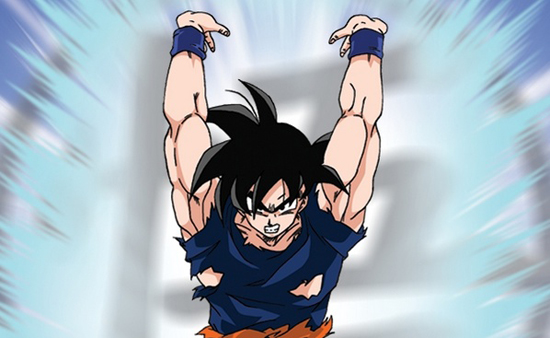
OUSA: You played Scorpion and Freddy Krueger in Mortal Kombat (2011), and–
Seitz: I didn’t play Freddy Krueger.
OUSA: What the heck, Internet?
Seitz: I know. Oh, I know. I’ve had to write to sources, saying “I swear guys, I didn’t play Freddy.” And that one doesn’t even make sense, because right around the same time one of the Call of Duty add-ons was a zombie thing where you could be Buffy and a bunch of other people. Freddy — Robert Englund — was one of the choices, so they got Robert Englund. He’s open to doing voice over. They don’t have to hire me to do a Robert Englund impression when they can hire Robert Englund to do a Robert Englund impression. And you know the Internet. There’s no footnote saying “could be, could not be.” The internet is convinced. “Seitz is Freddy Krueger, I’m sure, I would wager my life on it.”
OUSA: I should have known better. (laughs)
Seitz: At some point I’m gonna have to bring up a clip of it just so I can hear what I supposedly sound like. “Whoa, I sound just like him!”
OUSA: You played Scorpion in Mortal Kombat and Mortal Kombat vs. DC Universe. That role was, for about 10, 15 years, played by Mortal Kombat co-creator Ed Boon. He came up with the idea of a ninja who dresses in yellow and demands people to–
Seitz: To Get Over There.
OUSA: Yeah. When you were recording, was Ed Boon in the studio? Just standing there with his arms crossed, really stern look on his face the whole time? “That’s not how I’d do it.”
Seitz: Thankfully no, because that would freak me out. It’s cool that people are excited about meeting me in the capacity that I’ve voiced Scorpion. I always preface it with “no, it was only the past couple of games.” I never want to take any credit away from what Ed Boon did. I don’t want anyone to think that I’ve been voicing Scorpion from day 1. And if some day he walked up and told me “hey, I wanna be Scorpion again,” I’d be like “okay!” I almost look at it more as a stewardship than my own role.
I’ve sort of been doing my own thing, because the last game had a really long story mode with a lot of voiced dialogue. It’s gotten to the point now where I don’t know if it’s him or me saying “get over here.” They had me record it one way, trying to sound as close to Boon’s voice file as possible, and then my own way. There was a bit of a disconnect between what I was doing with the story mode’s dialogue, and what people expect from Scorpion in-game, so that was an attempt at sort of splitting the distance, somehow.
OUSA: You’ve also played Hugo in Street Fighter X Tekken, Bob from Tekken—
Seitz: Yeah. Man, Bob is fast! For a fat dude, he can really move.
OUSA: “Speed and weight,” right?
Seitz: Well, yeah, but… I thought that was just him talking big… (laughs) …but I saw someone playing him and I’m like… “whoa!” Because usually that’s the dichotomy. You’ve got the big, lumbering guy who kills you if he hits you, but good luck doing that. Bob’s got some speed on him. Hugo, though, was pretty much what I was expecting. Hugo is just a wall of beef.
OUSA: On that note, what was it like doing both Hugo and Bob in Street Fighter X Tekken?
Seitz: If I remember correctly, the client was a little reticent about it, actually, because they didn’t want a double-cast. Just across the board, they said “we’re not going to be double-casting on this.” But I don’t think they found anyone else who was, ah, low and bestial enough to their liking for Hugo. So I read a few things, and invented some dialogue back and forth between Bob and Hugo just so they could hear it back to back.
When we went in to record, we actually did something with the exerts. Those are the fighting sounds, the grunts and groans, and they can be hard to differentiate compared to actual dialogue. That was ultimately their main concern. “Okay, the dialogue sounds different, but the fighting stuff is a little similar.” My approach was to keep the Bob stuff shorter, cleaner, and more deliberate, while the Hugo stuff was much more… (terrifying noises) …just so there would be that difference.
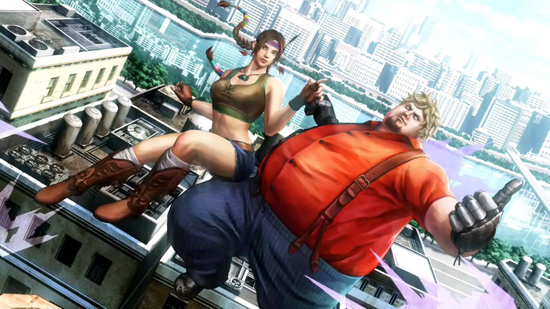
OUSA: You mentioned “exerts” there–
Seitz: Yeah, the fighting, the kicking, in anime it could also be the gasps and the laughs. Anything… non-word sounds. In fighting games, that’s a lot of it.
OUSA: Is there any kind of terminology like that out there that doesn’t get mentioned very often in the mainstream, maybe that people outside of the industry aren’t aware of?
Seitz: Not really. Y’know, with exerts they usually just tell you “okay, give me a small hit, a big hit, a medium hit.” That’s usually how they break it up. Small, medium, big… and then “death.” (laughs) You’ve got the short death, you’ve got the long death–
OUSA: The “My fight money!”
Seitz: Right. I think if it were any more arcane it would have its own lingo, but it’s all pretty simple for the most part.
OUSA: Does that vary at all by studio or director?
Seitz: The only difference mainly is on a project they may say, “Okay, we’re going to play the Japanese sounds, give us something really close to that.” And that works up to a point, until you have attack sounds like “SORYA!!” and “DORYA!!” …and those sound weird in English.
But a lot of the time they’ll just ask for small, medium, large, and it doesn’t have to sound like the Japanese at all. Usually they’ll play the Japanese just to make sure that the sound file for the English version is roughly the same length and size, which is why, incidentally, in JRPGS you sometimes have characters that scream attack names way, way too fast. That’s how long the sound file is in Japanese, so that’s all you got.
OUSA: Final question: You get a phone call one day, and it is for the dream project you never expected to be able to do, somehow it is happening. Maybe it’s never been done before. What is that project? And you have infinite time and money.
Seitz: If it were anime, it would be somebody saying “we’re doing the first 6 books of Dune as an anime series, and you are going to be in on this.”
OUSA: Oh, my. Which character would you play?
Seitz: Probably not Paul, just because my voice is too low and I’m too old. But maybe Duncan Idaho. Especially in the later books, once he just gets cloned up the wazoo. That would be awesome. I… I would clap my hands like a little girl! If you’re a big producer, and you’re reading this: make that happen. Make that happen!

